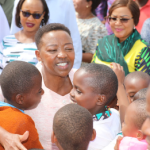President William Ruto underscored the imperative to safeguard and preserve the neutrality of international supply chains, highlighting their crucial role in ensuring global food security amid the ongoing Russia-Ukraine conflict.
Speaking at a peace summit in Switzerland on Sunday, Ruto called for urgent international measures to protect key trade and navigation routes, including the Azov and Black Seas, by designating them as global public goods exempt from any form of interference.
Ruto emphasized that the protection of these vital routes is essential for maintaining the stability of food supplies worldwide, given their strategic importance in the global trade network.
He urged the international community to take immediate action to secure these waterways and ensure they remain open and accessible for all, free from the disruptions caused by conflicts or other geopolitical tensions.
This appeal reflects the broader concern over the impact of the Russia-Ukraine conflict on global food supply chains and the necessity for collective efforts to mitigate these risks.
“The international community must act urgently to protect these vital economic and humanitarian arteries,” he stressed.
“Globalization has made consumers reliant on international supply chains for essential products, including food,” President Ruto stated.
He explained how European families rely on African farmers for flowers, fruit, tea, and nuts, whereas African households rely on European farmers for wheat and other grains, as well as fertilisers manufactured in Europe.
“Food security depends on efficient global commodity supply chains,” he added.
Ruto expressed concern about the supply chains’ vulnerability to conflict and climate change.
He noted that wars cause food shortages by disrupting supply chains and preventing local farmers from growing crops.
“The threat of starvation typically follows wars because food supply chains are vulnerable to blockades and sabotage,” he said, highlighting that Africa’s forgotten wars have escalated famine, particularly affecting children.
He also noted that climate change has exacerbated food insecurity, with 40 million people in Eastern Africa and 30 million in the Sahel currently facing famine.
“Wars and climate change have become mutually reinforcing disasters,” he stated.
The Head of State also emphasised the importance of farm inputs, particularly fertilisers, in ensuring food security.
He stated that conflicts have disrupted fertiliser supply chains, significantly affecting Kenya’s agricultural sector.
“The cost of fertilizer has gone up, and delivery now takes 45 days longer due to changed shipping routes,” he explained.
The President emphasised the broader implications of the Russia-Ukraine conflict, calling it a “war on our farms” that affects millions of African families.
“80% of malnourished children do not have access to treatment. War denies children education, nutrition, and medical care, making them direct casualties,” he said.
“The drums of war are the drums of hunger.”
Ruto advocated for a return to peaceful dialogue to save lives and improve global stability.
“War is a terrible means of solving misunderstandings. The sooner we return to peace-making through dialogue, the more lives we save,” he urged.



